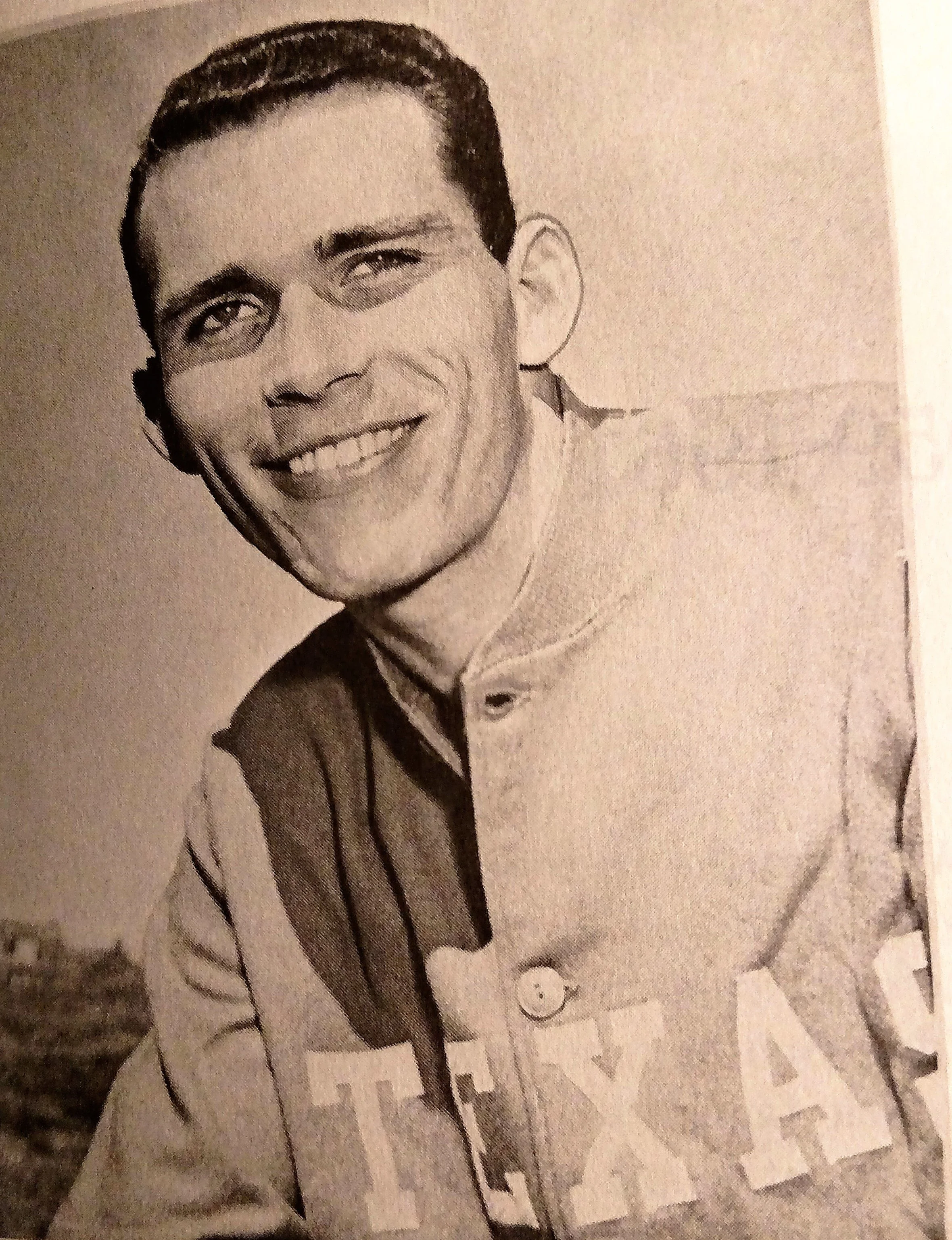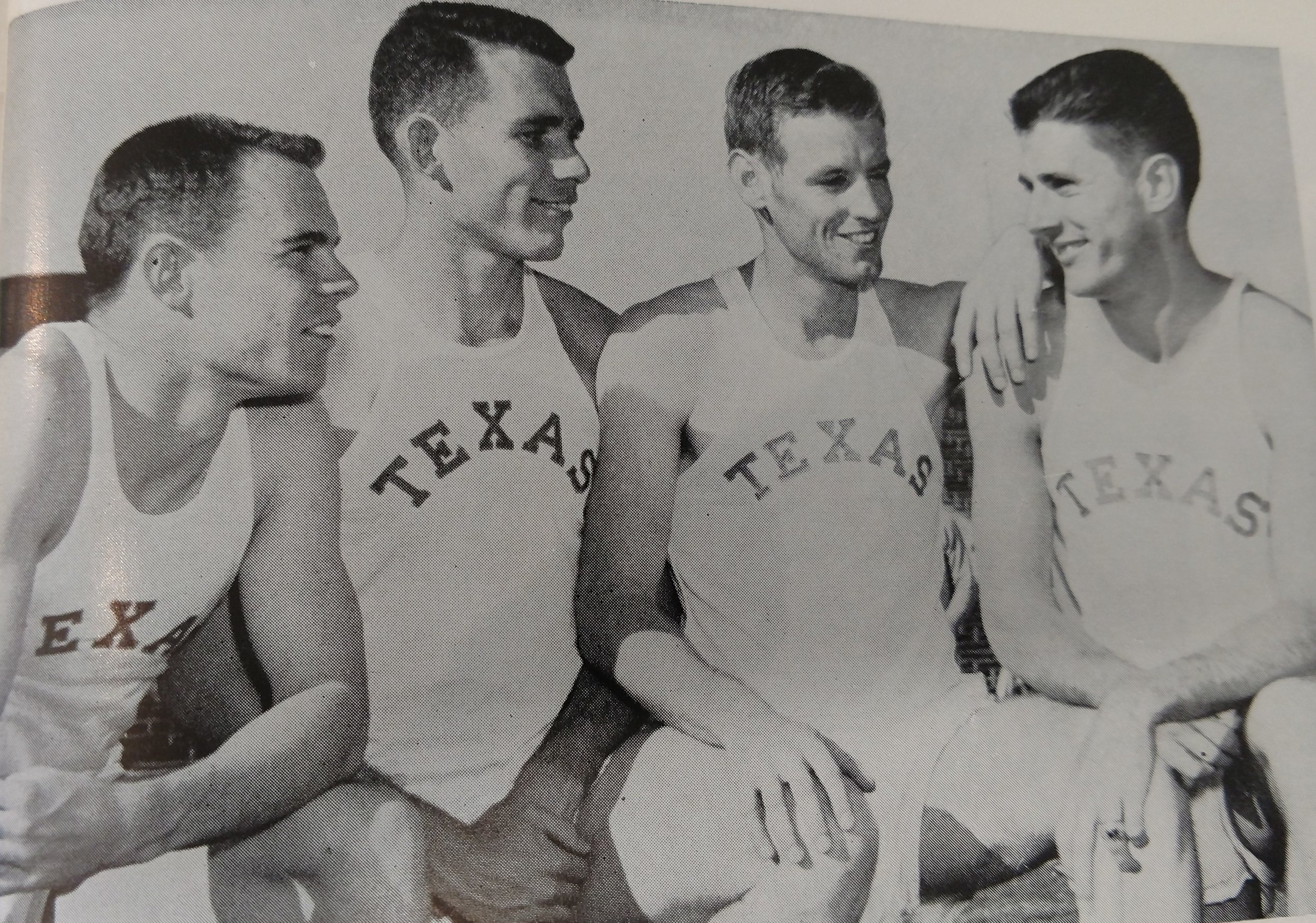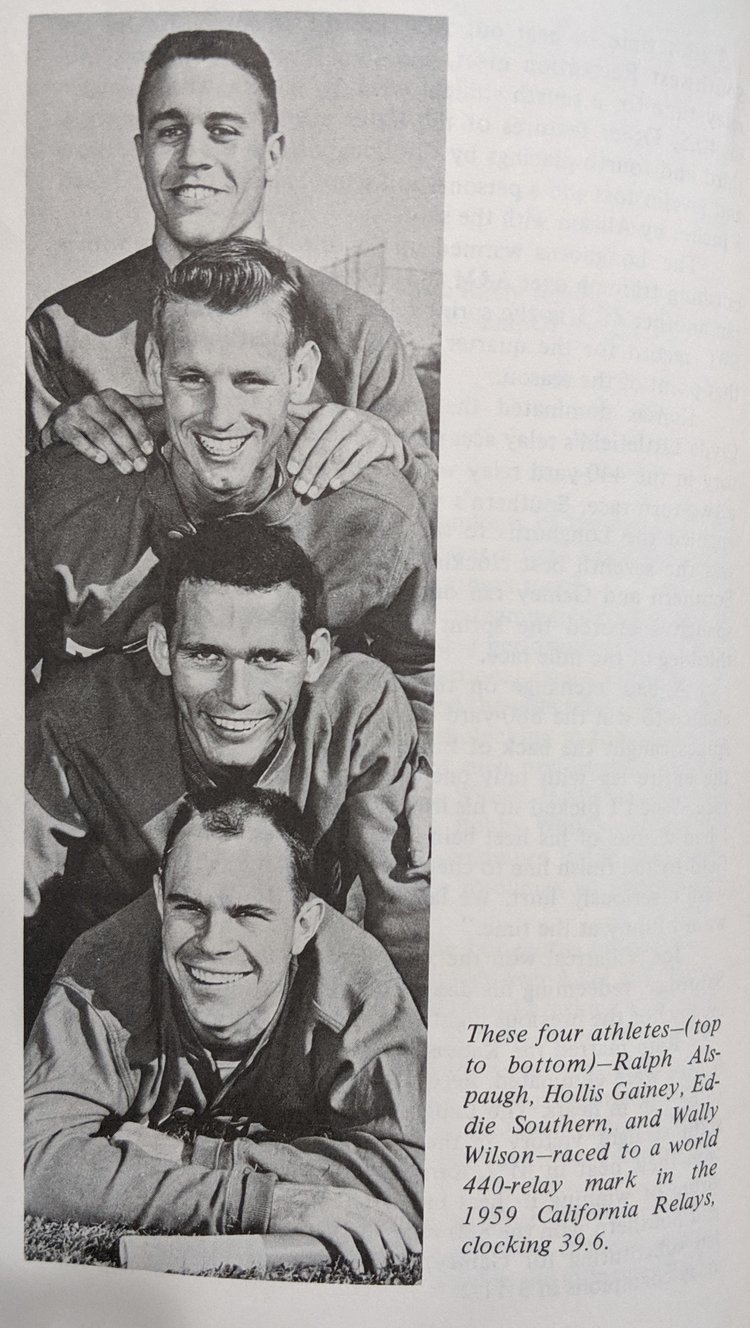Texas Athletics Hall of Honor inductee, Eddie Southern died on May 17, 2023.
Eddie Southern was an NCAA champion, Southwest Conference Champion, Olympic Silver medalist, Texas Track and Field Coaches Association Hall of Fame inductee, Sunset High Hall of Fame, and Drake relay athletes Hall of Famer.
Arguably, some of the best Longhorn track and field performances in the history of Longhorn sports were from 1942-1960. During those years, the Longhorns set many SWC and National records. Leading the contingent of record-setters was Eddie Southern.
Eddie Southern was the youngest member of the 1956 Olympic team. During the season, Eddie Southern broke the Olympic record in the 440 hurdles qualifying round and wins the silver medal in the finals.
A few other 5-star athletes included Ralph Alspaugh, Hollis Gainer, Charley Parker, Jerry Thompson, Dean Smith, and Frank Daugherty.
All these champions and more can be celebrated at the link https://texas-lsn.squarespace.com/19411961-clyde-littlefield-copy .
Eddie Southern Left Texas With 10 School Records.
• He set UT records in the 100 (9.4), 200 (20.5), 440 (45.8), and the short and long hurdles,
• Team co-captain in 1959
• Led UT to SWC track titles from 1957-59
• Never lost an SWC race; as a junior, won the SWC in the 100 and 220.
• Won SWC 440-yard dash and mile relay events from 1957-59
• Won the 1957 SWC 120-yard high hurdles and 1958 SWC 100-yard dash
• High point man at the 1958 SWC meet
• Member of UT world record-setting 440-yard (39.6) and 880-yard relay teams (1:22.7)
• Won silver medal in 400-meter hurdles for the U.S. team at the 1956 Olympics.
Southern was inducted into the Friar Society, the oldest honor society at The University of Texas, which recognizes students who made significant contributions to UT. The Friar Society's purpose is "to associate together leading members of the senior or graduate classes for mutual benefit and cooperation, and to promote the best interests of the UT and the student body."
Eddie Southern is the youngest member of the 1956 Olympic team. During the season, Eddie Southern breaks the Olympic record in the 440 hurdles and wins the silver medal.
Southern was inducted into the Friar Society, the oldest honor society at The University of Texas, which recognizes students who made significant contributions to UT. The Friar Society's purpose is "to associate together leading members of the senior or graduate classes for mutual benefit and cooperation, and to promote the best interests of the UT and the student body."
05.18.2023 | Track & Field / Cross Country TexasSports.com
Part of Texassports.com's great article on Eddie Southern with images added by TLSN follows:
Transitioning from high school to college and following a year on UT's freshman squad, Southern made a critical decision that would cement his legacy on the world stage. He elected to utilize his unique skill set and take up the hurdles where he quickly thrived in the one-lap (400m/440-yard) variety.
Longtime friend and UT teammate Shelby Sharpe tells Eddie’s story.
"The story goes, Eddie went to his Young Life leader as a freshman, who was Cleburne Price and talked about his dreams of trying out for the Olympics, but as a young quarter-miler, was concerned that he was not as strong as the more experience and mature people in that race," Sharpe said. "Coach Price said, 'why don't you do the intermediate hurdles? You're a good hurdler, a good quarter-miler, and I think you'd be great at that race.'
“After just five races, he's in another country, breaking the Olympic record in his new event. And, if not for clipping the last hurdle in the final, he wins the gold medal and he probably breaks the world record."
That race was the culmination of a sensational year for the 18-year-old UT freshman. He finished second to one of America's legendary 400-hurdlers, Ohio State's Glenn Davis, at both the U.S. Olympic Trials and the Olympic Games. At the trials as the runner-up, he clocked the second-fastest time ever (49.7) in that event. Facing a field of 28 competitors from 18 nations that included two of the finalists from the 1952 Games, Southern cleanly cleared 400-meters of hurdles to win his first-round heat, then set an Olympic record of 50.1 in the events prelims at the Melbourne Games. In a tightly contested final, he went on to finish second to Davis to secure the silver medal. Davis tied the UT freshman's Olympic record time of 50.1 in winning that race, while Southern fought to the finish, just at step behind at 50.8.
Southern's performance was monumental in Longhorn lore as he became the second Texas Track & Field standout to win an Olympic medal, and the first to earn one in an individual event. In fact, he was just the fourth Longhorn in any sport to ever secure an Olympic medal, the third in an individual event.
One of the world's top track & field performers, Southern's Longhorn career carried high expectations running for legendary coach Clyde Littlefield. After making a splash competing in freshman events in 1956 when freshman weren't eligible to participate at the varsity level, he lived up to the high hopes and more, continuing to produce records, victories and honors for the Longhorns from 1957-59. He still hurdled, more in the shorter, high hurdle race, but turned his primary focus to the 440-yard dash. As a team captain in 1959, he won the NCAA title in the 440 (46.4) as a senior after finish second as a junior.
And, when it came to conference competition, no matter what he ran, he was unbeatable, never losing a Southwest Conference race. He won three-straight SWC titles in the 440-yard dash and mile relay events, while leading the Horns to conference team championships all three years as well. Southern also registered first-place finishes at the SWC Championships in the 120-yard high hurdles in 1957 and the 100-yard dash in 1958. He was the high point scorer at the 1958 SWC meet.
Southern was a key leg on historical relay efforts during his time at UT as well. He was a member of the Longhorns 880-yard relay team that set a world record (1:22.7) at the 1957 Texas Relays. And, as the anchor of the mile relay team at the Kansas Relays in 1958, he became the first person to run the quarter mile in under 45 seconds. Southern anchored the 440-yard relay team that set two world records during his time with Texas as well, the final one a 39.6 clocking at the 1959 California Relays.
"That 39.6 world record was remarkable, it was one of the first times a team broke 40-seconds and they did so significantly" Shelby added. "But even more impressive was that Eddie and our team were facing a San Jose squad of much faster sprinters individually, with a couple who ran 9.3. We broke that record because of teamwork, and handoffs. Clyde Littlefield teams never dropped handoffs and worked diligently on the speed of the exchange, which Eddie was as good as anyone at. Watching the relays he was on was a sight to behold."
1958 The Texas 400 relay team composed of Hollis Gainey, Eddie Southern, Bobby Whilden, Wally Wilson breaks the 40-second barrier in a world record time of 39.9.
Along with magnificent achievements at premier events like the Drake and Kansas Relays, Southern was well known for thrilling races on his home turf at the Texas Relays, then held on the track surrounding the Texas Memorial Stadium football field in his days. He helped the Longhorns win the 4x400m relays all three of his years at UT (1957-59). On the heels of victories in the 4x200m and 4x400m relays as well as individually in the 120-yard high hurdles, Southern played a key role in the Horns claiming the prestigious Texas Relays Most Outstanding Team in 1957. He returned to the Texas Relays after his collegiate glory to win back to back 440-yard hurdle crowns in 1960 and 1961. When he lined up for that race in 1960, it was the first time since the 1956 Olympics that he'd run a 440-yard hurdle race and his victorious 51-flat effort did not disappoint.
Wally Wilson and Eddie Southern
"Back in the day, some of the relays used to give watches to their champions," said Sharpe. "Eddie won so many, he'd share those with his friends and teammates. He always said, 'why do I need more than one'. He was so generous, caring, giving, and wanted everyone to be happy."
A 1959 Texas graduate with a business degree, he competed for his final time internationally that year in the Pan American Games, winning a silver medal with the USA's 4×400m relay team. And to further illustrate the immense talent he had, even though he didn't play football at Texas, Southern was selected by the Chicago Bears in the 29th-round of the 1959 NFL Draft, but passed on the opportunity to play in the league.
A PASS IN TIME
AS THE OUTDOOR TRACK SEASON OPENS, THE INTRICATE ART OF THE RELAY TAKES THE SPOTLIGHT:
The lean, dark youngster bounced gently up and down on the track, shaking his hands loosely to relax his arm and chest muscles. He looked back across the curve of the track to the start of the 440-yard relay, his face intent and concentrated. As the runners across the field crouched to await the starter's gun, he took his position just inside the white mark in his lane which marked the beginning of the exchange zone. When the gun cracked he crouched slightly, in a sprinter's starting stance except that his hands were on his knees rather than on the track.
As the field rounded the curve, their speed exaggerated by the bend of the track, he looked steadily back over his right shoulder at the first runner for the University of Texas team, and as that first man hit a mark some 21 feet from the exchange zone, Eddie Southern took off.
He did not look back again, but as he neared the line indicating the end of the exchange zone he dropped his right hand—palm to the rear, fingers extended together, thumb out—and held it there until he felt the baton slap up between his thumb and forefinger, then, changing the baton from his right to his left hand, he fled down the backstretch. Texas, traditionally a producer of fine teams, won the event, one of the features of the Texas Relays two weeks ago, in 40.4 seconds, 7/10 of a second off the world record for this race. The baton exchange between Wally Wilson, who ran the opening leg for Texas, and Southern had been beautifully smooth, and the baton changed hands with both runners at very nearly top speed.
"It was a good exchange," Southern said later. "Good, but not excellent."
……………..
Aside from the essential speed which is needed for the four men who make up a relay team, the most important factor in producing world records is the baton exchange.
……….
The baton exchange is made from the left hand to the right, and the outgoing runner never looks back once he starts. He takes the inside third of the lane and the runner coming up takes the outside, shouting instructions as he comes up so that he will not overrun his teammate or be left too far behind to make the exchange in the zone.
……..
Eddie Southern, Texas' fine sprinter and quarter-miler, ran the second leg for his team for the reason Jackson pointed out. A veteran of the Olympics, Southern gave Texas a wide lead going into the second exchange, which helped hurry the other teams into something less than excellent baton passes.
Individually, Southern earned three straight 440-yard SWC championships in 1957, 1958, 1959 and the 1959 NCAA quarter-mile title. Southern ran the anchor for the world record 440 and 880-yard relays while at the University of Texas.
Southern won another silver medal in the 4 x 400m relay at the 1959 Pan American Games.











